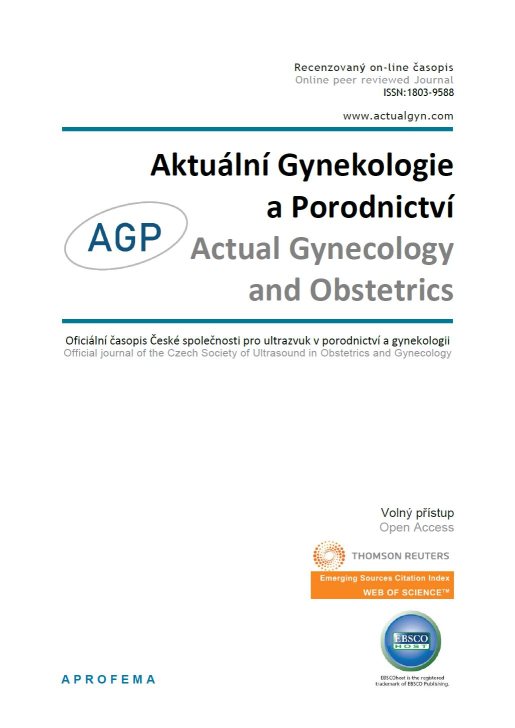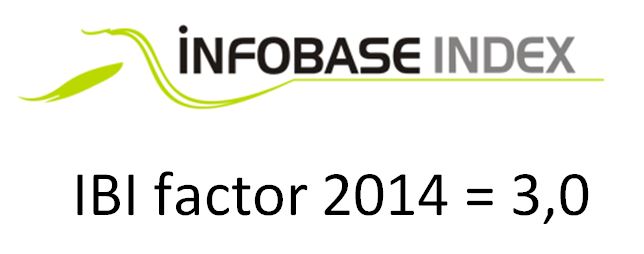











 Official publication of the Czech Society of Ultrasound in Obstetrics and Gynecology.
Official publication of the Czech Society of Ultrasound in Obstetrics and Gynecology.

This clinical case describes an aphasia after the vaginal delivery at 39 years old primigravida in term as a first manifestation of multiple sclerosis. Early postpartum episode was complicated by hypotonia and anemia.
On the third day patient presented herself with anxiosity, dysphasia and instability. The working diagnose was ischemic stroke of unknown length and computerized tomography (CT) was done. During the afternoon patient presented with transitory mydriasis on left eye and her status deteriorated to severe dysphasia/aphasia and enhanced reflexes on the right side. Despide CT not displaying any changes (bleeding), nor occlusions, the conclusion of neurologist remained cerebral ischemia. Results were consulted with tertiary center and conservative treatment was recommended.
Next day due to aphasia magnetic resonance imaging (MRI) was done. MRI displayed multiple hypersignal focuses in the white matter around lateral ventricles and corpus callosum in T2 and FLAIR (FLuid Attenuated Inversion Recovery) sequences.
This suggested primary manifestation of multiple sclerosis and lumbar punction was done. A therapy with methylprednisolone was started immediately. The punctate displayed elevation of cytokines in liquor and serum. In liquor dominated elevation of interleukine-8 and interleukine-6 with no specific agent isolated.
This clinical case displays the deceptiveness of multiple sclerosis which can demonstrate itself like cerebral stroke. The manifestation of multiple sclerosis mimicking stroke is a rare condition that occurs in about 2% and acute aphasia is even rarer.
To our knowledge this is the first report about acute aphasia mimicking stroke as a first manifestation of the multiple sclerosis.
This clinical case describes an acute state of aphasia developed after the vaginal delivery as a first manifestation of multiple sclerosis.
The patient was 39 years old primigravida that presented herself in 38th week of gestation at the maternity in June 2021.
The pregnancy was conceived by in vitro fertilization procedure and due to the age patient underwent amniocentesis with normal karyotype finding. The estimated fetal weight was in 36th week of gestation 3400 g (95th percentile). Patient was GBS negative and after the onset of contractions delivered a healthy baby girl (occiput anterior, 4150 grams, APGAR 10-10-10) within six hours.
The early postpartum episode was complicated by hypotonia which led administration of uterotonics and due to the estimated blood loss of 600 milliliters and signs of anemia (Hb 91 g/l, leukocytes 21.8 x 109 /l) four transfusion units of red blood cells were transfused.
In the morning on the third day after the delivery the patient presented herself with anxiosity, dysphasia and instability. The neurologist´s working diagnose was ischemic stroke of unknown length (or so-called wake-up stroke).
A computerized tomography (CT) was done. During the afternoon patient presented with transitory mydriasis on left eye and her status deteriorated to severe dysphasia/aphasia and enhanced reflexes on the right side. Eventhough the CT did not display any focal changes, nor arterial occlusions in the circle of Willis, the conclusion (working diagnosis) of neurologist was cerebral ischemia on the left side in the speech center with dysphasia/aphasia and slight monoparesis of the right hand. The CT scans and neurological finding were consulted with tertiary cerebral unit. As intravenous thrombolysis is contraindicated after delivery (within 7 days) and no occlusion was found, conservative treatment was recommended. This involved administration of 500 mg of acetylsalicylic acid and 20 mg of atorvastatine.
The next day due to aphasia another CT was done followed by magnetic resonance imaging (MRI) and magnetic resonance angiography (MRA). The CT did not aid to the diagnosis, but MRI displayed multiple hypersignal focuses in the white matter around lateral ventricles and corpus callosum in T2 and FLAIR (FLuid Attenuated Inversion Recovery) sequences.

This finding suggested primary sudden manifestation of the multiple sclerosis and lumbar punction was indicated. A therapy with methylprednisolone 500 mg intravenously per day was started immediately.
The lumbar punctate displayed elevation of cytokines in liquor and serum. In liquor dominated elevation of interleukine-8 (IL-8) and IL-6 with no specific agent isolated. This suggested inflammatory process in the liquor compartment and supports the diagnosis of the multiple sclerosis (1,2).
This clinical case displays the deceptiveness of multiple sclerosis which can demonstrate itself like cerebral stroke. The manifestation of multiple sclerosis mimicking stroke is a rare condition that occurs in about 2% (3). The acute aphasia is even rarer, according to Lacour et al. this happens only in 0.81% (4).
To our knowledge this is the first report about acute aphasia mimicking stroke as a first manifestation of the multiple sclerosis.
The author declares no conflict of interest.